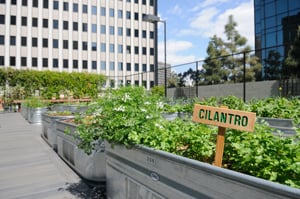Ranging from rogue to calculated, urban farms have sprouted up across Los Angeles.
The reasons – from a desire to create sustainable, cost-effective sources of food to an amenity that helps draw tenants – are as distinct as the parcels they occupy.
Dan Allen, chief executive of Farmscape Gardens, a Highland Park business that helps developers, schools, and nonprofits plan, install, and manage urban gardens, said that what started as an amenity at single-family homes has become a key component for many commercial developers.
“It started as something that people understood in residential context,” said Allen, adding that his corporate clients have increased in the last five years.
He said his company has 30 full-time employees and has worked on 200 gardens in Los Angeles, including the Jonathan Club’s rooftop garden downtown, and an additional 50 in the Bay Area. Allen said his business has been hired by developers whose tenants see such citified gardens as integral to attracting talent and by food service providers on corporate campuses that find cultivating their own herbs and vegetables a fresh, money-saving, environmentally sound endeavor.
Then there are the rogues. From the erstwhile South L.A. farm that grew on fallow land the city failed to develop to a tiny street-corner parcel in Santa Monica, sometimes the motivation can be as simple as a desire for fresh, inexpensive food.
– Jonathan Diamond

